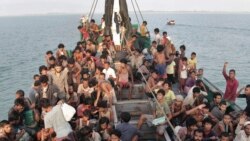The United States is gravely concerned about the plight of the Rohingya population in Southeast Asia.
The Rohingya are a Muslim minority population of around 1.2 million people living in Burma’s Rakhine State, where they are subject to religious-based discrimination and violence and exploitative conditions, including forced labor by the Burma Army, undue restrictions on freedom of movement, and impeded access to medical care and food.
They are restricted in marriage and building or maintaining religious buildings. Despite living in Burma for generations, they are made stateless by policies set by previous military regimes. Tens of thousands live in camps for internally displaced persons, with little access to livelihoods, markets, food, or places of worship. They have become increasingly vulnerable to human traffickers who entice them with promises of a better life abroad.
Up to an estimated half a million undocumented Rohingya refugees live in neighboring Cox's Bazar district in Bangladesh, and around 32,000 registered Rohingya live in the district’s Kutupalong and Nayapara refugee camps, having fled military campaigns and sustained persecution in Rakhine state.
The United States has consistently called on the Burmese government to improve the humanitarian situation in Rakhine State by allowing unrestricted humanitarian access to all communities in need.
The United States has consistently called on the Burmese government to improve the humanitarian situation in Rakhine State by allowing unrestricted humanitarian access to all communities in need and facilitating the voluntary return of internally displaced Rohingya to their places of origin. President Obama voiced his concerns earlier this summer.
I think if I were a Rohingya, I would want to stay where I was born. I'd want to stay in the land where my parents had lived. But I'd want to make sure that my government was protecting me, and that people were treating me fairly. That's what I'd want. And that's why it's so important I think, as part of the transition, to take very seriously this issue of how the Rohingya are treated.
We must all work together to address the conditions in Rakhine State.






